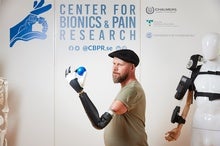 |
| October 31, 2023 |
Today's large language models can produce human-sounding text, but they do not actually understand the rules of grammar underlying the sentences they spit out. Now researchers have tested out a new training method that enables their AI model to generalize about the rules of a made-up language—just like humans do. |
| |
 |
| |
| |
| |
| |
| |
| |
| |
| |
| Materials Science Fungi Make Safer Fireproofing Material Scientists are now growing mycelium, the fungal root network, into fire-retardant sheets to provide a safer, nontoxic way to protect buildings | | | | |
| |
| QUOTE OF THE DAY
 "NASA, together with the European and Canadian space agencies, is already executing a program to return humans to the moon after a half-century gap in its exploration. This laudable goal comes with no small risk, but one simple threat is perhaps not taken seriously enough: What if someone on one of these flights is stricken with lycanthropy?" Phil Plait, Scientific American | |
FROM THE ARCHIVE
 | | How AI Knows Things No One Told It Researchers are still struggling to understand how AI models trained to parrot Internet text can perform advanced tasks such as running code, playing games and trying to break up a marriage By George Musser | May 2023 | | |
LATEST ISSUES
 |
| |
| Questions? Comments?  | |
| Download the Scientific American App |
| |
| |





















